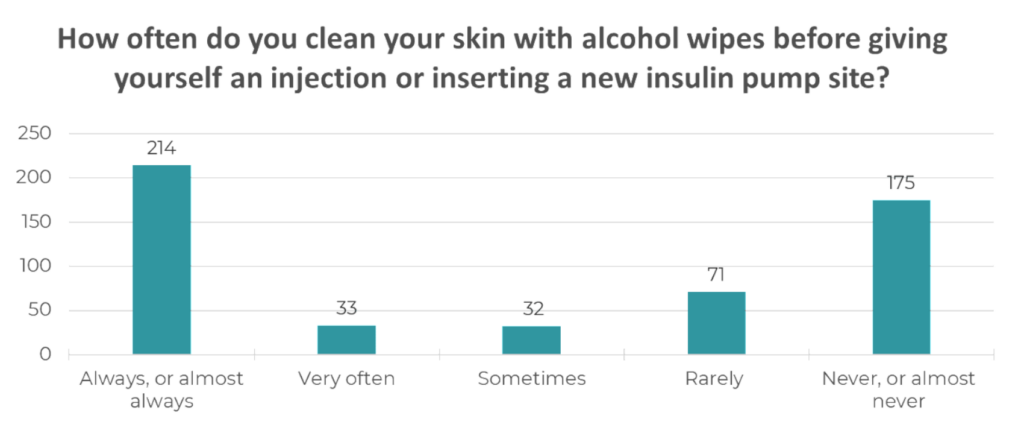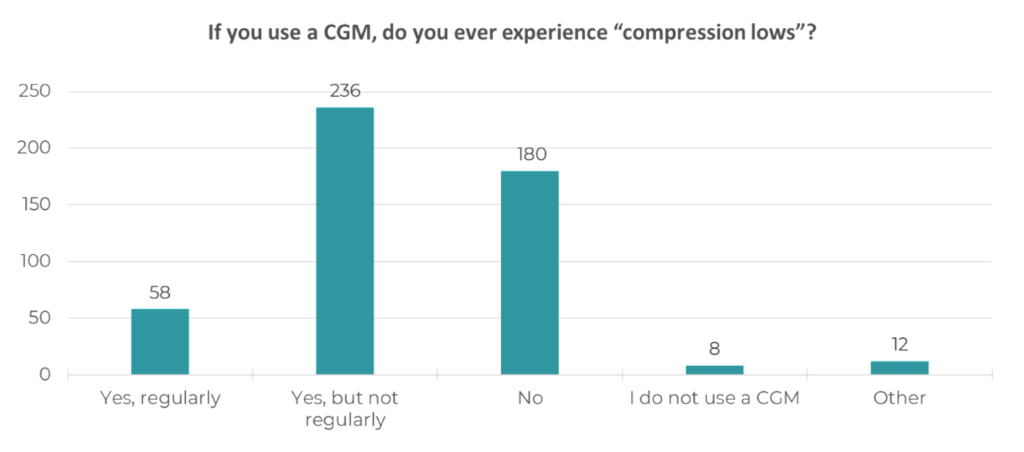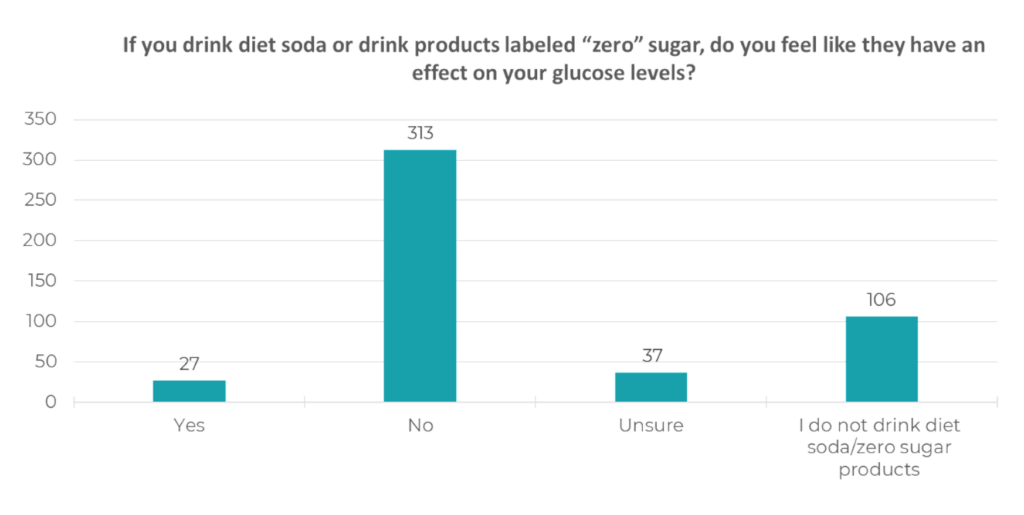
Sign up for a new account.
And get access to
The latest T1D content
Research that matters
Our daily questions
Sign up by entering your info below.
Reset Your Password
Don't worry.
We will email you instructions to reset your
password.
What We Learned from the Online Community in August
We learn something new every day from our community’s responses to the Question of the Day. Here are the three most popular questions of August 2022!

How often do you clean your skin with alcohol wipes before giving yourself an injection or inserting a new insulin pump site?
August’s most popular question had over 530 responses!
- 214 responses: “Always or almost always.”
- 175 responses: “Never or almost never.”
Many responses expressed feeling worried about infections from not cleaning sites before performing an injection. Prepping any area with an alcohol swab is absolutely recommended for injections, insulin pump sites, or CGM sensors. Some responses expressed that they used to use alcohol swabs regularly, but as time goes on, they have become less consistent with the task.
Popular quotes from the community:
- “I am sooooo paranoid about infections! I always use alcohol wipes when sticking sharp things into my body!”
- “When I first became a diabetic, my doctor told me to always clean my sites with an antiseptic; sanitation is important. I always clean my injection and insertion sites with alcohol wipes, IV Prep wipes or Skin Prep wipes.”
- “I never bother to wipe for an injection but I do for my CGM sensor. Indeed, I have no qualms about injecting through my shirt—and can inject when surrounded by people who never even know I’ve done it—beyond the problem of occasional blood spots on my T-shirt.”
- “I do if I did not just take a shower but I usually do it after a shower. As a doctor, I see few infections but some people are far more prone to site infections.”
- “I have at some point in my life, but it’s been long enough ago that I have no idea when I’ve last used alcohol—probably at least 30 years.”

If you use a CGM, do you ever experience “compression lows”?
These are inaccurate CGM readings that occur when there is pressure placed on the CGM transmitter and sensor. They typically look like a sudden and drastic drop on a CGM graph, and often occur when a person is lying on their sensor while sleeping.
Our second most popular question this month had over 500 responses and regarded our community’s experience with compression lows. It is frustrating having to wake up in the middle of the night for a low blood sugar, but it is even more frustrating when it is for a compression low.
- 236 responses: “Yes, but not regularly.”
- 180 responses: “No.”
Many responses shared that they try to avoid putting their CGM in a location where this could be a problem.
Popular quotes from the community:
- “Yes, and it’s why I also rarely use my arms anymore, since I need to sleep!”
- “It was a serious problem when I did as Dexcom recommended—and put the sensors on my belly. There is simply no belly location that doesn’t get compressed at some point at night because I turn around quite a bit. Lately I’ve switched to the inner part of my upper arm as a sensor location and have had no problem—even though that is not a recommended site. (I suspect their recommendations are based solely on where they placed the sensors during their clinical trials, rather than on any more thoughtful consideration.)”
- “Just had one early this morning because I was sleeping on the arm that has the Dexcom G6 sensor. It does not happen all the time. Since I can surmise it’s a ‘compression low,’ I don’t get up to do any corrections. My alarm will go off again if I really am going low. So, back to sleep!”
- “Compression lows are extremely frustrating and are the #1 reason we have regular sleepless nights! Wish something could be done about this, especially with little kids and their terrible sleeping positions. This is a big issue in our household.”

If you drink diet soda or drink products labeled “zero sugar”, do you feel like they have an effect on your glucose levels?
Our third most popular question this month had 489 participant responses.
- 313 responses: “No.”
- 106 responses: “I do not drink diet/zero sugar products.”
Many responses also shared that drinking anything with caffeine typically results in a blood sugar spike, but drinks containing zero carbs should not have any effect on your blood sugar.
Popular quotes from the community:
- “Diet Coke rules and no impact in 48 years. I was raised on saccharin and live on stevia today”
- “Like all premade drink and food, the ingredients must be read. I rarely drink diet soda anymore, preferring water-best drink in the world! Tried “zero sugar” soda only to read its sweetened with corn syrup. Promptly poured the rest down the drain. Manufacturers are sneaky devils!”
- “I drink soda water without artificial sweeteners. Also water—which is zero sugar. I believe staying hydrated helps keep my blood sugar in the desired range.”
- “Some do and some don’t—depends on ingredients Diet Coke doesn’t but Ice does, as well as Diet Mountain Dew original”
- “Zero does not mean no sugar.”
Thank you to every member of the T1D Exchange Online Community for sharing your experiences. Your words inspire others who come to this community looking for advice and the reminder that they’re not alone.
If you are not already a member of the T1D Exchange Online Community, join us by clicking the “Join” button in your upper right corner!








1 Comment